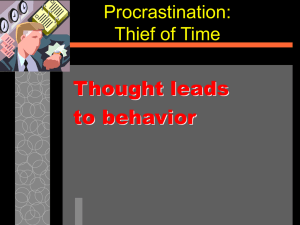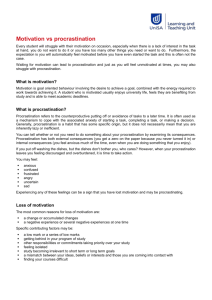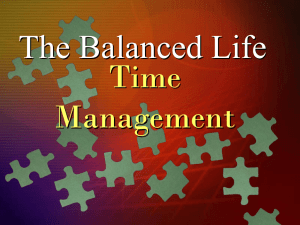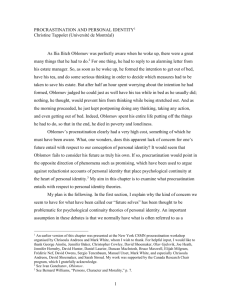Procrastination: Is Your Future Self Getting a Bad Deal?
advertisement
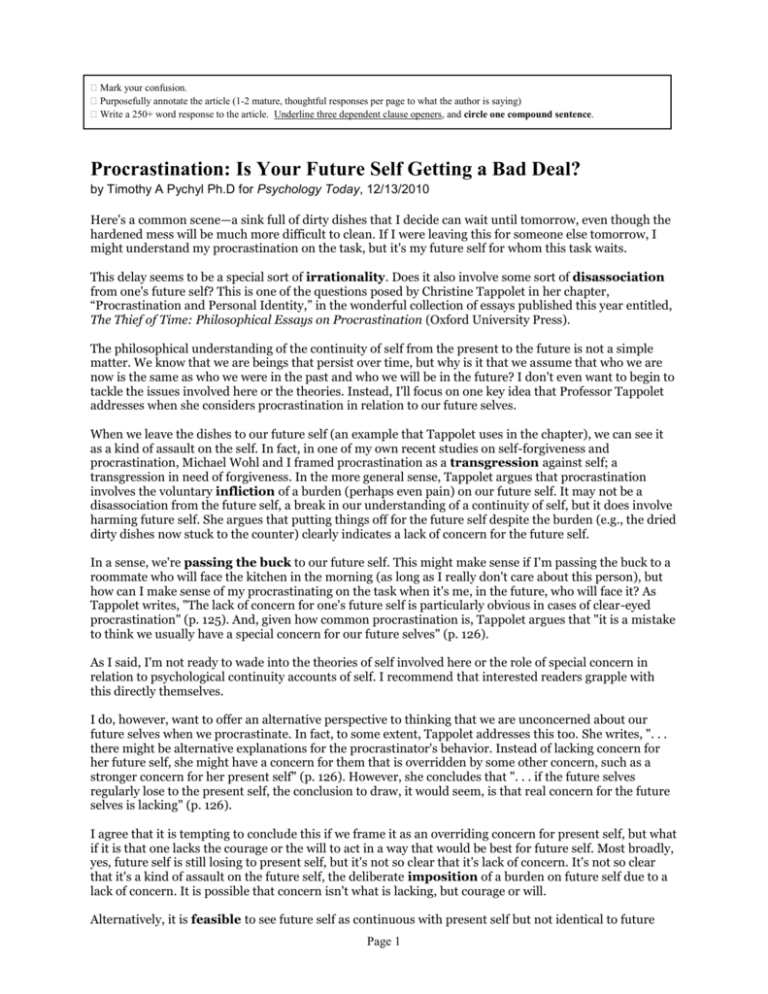
� Mark your confusion. � Purposefully annotate the article (1-2 mature, thoughtful responses per page to what the author is saying) � Write a 250+ word response to the article. Underline three dependent clause openers, and circle one compound sentence. Procrastination: Is Your Future Self Getting a Bad Deal? by Timothy A Pychyl Ph.D for Psychology Today, 12/13/2010 Here's a common scene—a sink full of dirty dishes that I decide can wait until tomorrow, even though the hardened mess will be much more difficult to clean. If I were leaving this for someone else tomorrow, I might understand my procrastination on the task, but it's my future self for whom this task waits. This delay seems to be a special sort of irrationality. Does it also involve some sort of disassociation from one's future self? This is one of the questions posed by Christine Tappolet in her chapter, “Procrastination and Personal Identity,” in the wonderful collection of essays published this year entitled, The Thief of Time: Philosophical Essays on Procrastination (Oxford University Press). The philosophical understanding of the continuity of self from the present to the future is not a simple matter. We know that we are beings that persist over time, but why is it that we assume that who we are now is the same as who we were in the past and who we will be in the future? I don't even want to begin to tackle the issues involved here or the theories. Instead, I'll focus on one key idea that Professor Tappolet addresses when she considers procrastination in relation to our future selves. When we leave the dishes to our future self (an example that Tappolet uses in the chapter), we can see it as a kind of assault on the self. In fact, in one of my own recent studies on self-forgiveness and procrastination, Michael Wohl and I framed procrastination as a transgression against self; a transgression in need of forgiveness. In the more general sense, Tappolet argues that procrastination involves the voluntary infliction of a burden (perhaps even pain) on our future self. It may not be a disassociation from the future self, a break in our understanding of a continuity of self, but it does involve harming future self. She argues that putting things off for the future self despite the burden (e.g., the dried dirty dishes now stuck to the counter) clearly indicates a lack of concern for the future self. In a sense, we're passing the buck to our future self. This might make sense if I'm passing the buck to a roommate who will face the kitchen in the morning (as long as I really don't care about this person), but how can I make sense of my procrastinating on the task when it's me, in the future, who will face it? As Tappolet writes, "The lack of concern for one's future self is particularly obvious in cases of clear-eyed procrastination" (p. 125). And, given how common procrastination is, Tappolet argues that "it is a mistake to think we usually have a special concern for our future selves" (p. 126). As I said, I'm not ready to wade into the theories of self involved here or the role of special concern in relation to psychological continuity accounts of self. I recommend that interested readers grapple with this directly themselves. I do, however, want to offer an alternative perspective to thinking that we are unconcerned about our future selves when we procrastinate. In fact, to some extent, Tappolet addresses this too. She writes, ". . . there might be alternative explanations for the procrastinator's behavior. Instead of lacking concern for her future self, she might have a concern for them that is overridden by some other concern, such as a stronger concern for her present self" (p. 126). However, she concludes that ". . . if the future selves regularly lose to the present self, the conclusion to draw, it would seem, is that real concern for the future selves is lacking" (p. 126). I agree that it is tempting to conclude this if we frame it as an overriding concern for present self, but what if it is that one lacks the courage or the will to act in a way that would be best for future self. Most broadly, yes, future self is still losing to present self, but it's not so clear that it's lack of concern. It's not so clear that it's a kind of assault on the future self, the deliberate imposition of a burden on future self due to a lack of concern. It is possible that concern isn't what is lacking, but courage or will. Alternatively, it is feasible to see future self as continuous with present self but not identical to future Page 1 self. For example, future self is not as tired as present self is now. Future self will have more energy to face the dishes tomorrow. More energy means more willpower, something that present self lacks now. In short, present self doesn't see this as an imposition on future self, at least certainly not as much as it is on the exhausted present self. So, on the one hand, our procrastination may reflect a moral failing of present self in relation to future self (a lack of courage), and on the other hand it may reflect an optimistic (and perhaps a naïve) hope that future self will have attributes that present self lacks (e.g., energy). In neither case do we have to assume a lack of special concern for future self. In saying this or raising these alternatives, I am not straying far from Tappolet's conclusions, however. She writes, "The picture of procrastination I have sketched suggests that our relation to our future selves is not significantly different from the relation to our fellow human beings" (p. 128). Tappolet then explains that we can learn from how to deal more effectively with others to deal more effectively with future self. Specifically, she argues that when we lack concern for others, we need to develop empathy. We need to put ourselves in their shoes, to imaginatively identify with them. When we do, we will increase our concern and change our actions towards them. Similarly, if we can harness this imaginative identification with the fate of our future selves, we may not be so quick to pass the buck and procrastinate on the task at hand now in favor of a future moment. Our empathy for future self will prevent us from making such as present-focused decision. Of course, my alternative explanations can draw on this comparison between other human beings and the future self. Where either lack of courage or will is the case, we may need to remind ourselves that our future self is every bit as deserving as another human being of care. Ironically, many of us demonstrate courage and acts of willpower in the service of others but not to self. Perhaps, to the extent that we can identify future self with the deserving other, we will muster up the will and/or courage to act on our intentions so as not to burden future self. Finally, I do think it is fair to lean on the strength of others at times, not to burden them, but to graciously accept their willing acceptance of a load that we may no longer be able to bear at the present time. In this case, the rested, restored and revitalized future self may more effectively deal with these dishes and willingly accept this task with thanks for the fine dinner that present self (now past self) prepared last night. That's the hope at least, but this too may be another aspect of the irrationality of procrastination. And, yes, only a philosopher and a psychologist can make washing the dishes this complex. ☺ Reference Tappolet, C. (2010). Procrastination and Personal Identity. In C. Andreou & M.D. White (Eds.) The Thief of Time: Philosophical Essays on Procrastination (pp. 115-129). New York: Oxford University Press. Possible response options: ● Part 1: In what ways do you procrastinate? Describe a situation in your own experience that’s common, like the dish-washing scenario is to the author of this article. ● Part 2: To what do you most blame your procrastination: a lack of courage? being naive? The author makes other suggestions as well. Explain your answer. ● How do you attempt to overcome procrastination? When, if ever, have you been successful against procrastination in the past? What helped you then? ● Choose any passage and respond to it. Page 2

